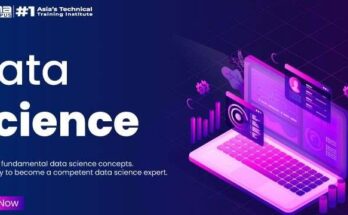Data Science is a field where knowledge is extracted by analyzing and processing vast data using different techniques. Today, Data Science is extensively used in businesses, internet searches, image and speech recognition, AR and VR, gaming, etc. Moreover, industries use this technology for healthcare, fraud detection, recommendations, airline route planning, logistics, and so on. Delhi NCR is one of the hub spots of IT companies. Cities like Noida and Gurgaon have numerous IT companies that hire skilled IT professionals. Therefore, one can join Data Science Training in Noida if they are planning a DS career in a Noida-based company. These training courses enable one to use DS to solve various business issues. Thus, Data Science training enables one to get hired in positions like Data Scientists, Data Analysts, Data Architects, ML Engineers, etc.
This content explains the essential tools used for Data Science processes. Read on to learn more about the Data science tools.
15 Important Data Science Tools
Data Science relies on a variety of tools to gather, analyze, and derive insights from data. Here are fifteen important tools used in Data Science, each serving a unique purpose in the data-driven decision-making process.
- Python: Python is the go-to programming language for data scientists. Its simplicity, versatility, and extensive libraries (such as NumPy, Pandas, and Scikit-Learn) make it ideal for data manipulation, analysis, and machine learning.
- R Programming: R is another powerful programming language tailored specifically for statistical analysis and data visualization. It’s favored in academia and certain industries for its robust statistical packages.
- Jupyter Notebook: Jupyter Notebook is an interactive web-based tool that enables data scientists to create and share documents containing live code, visualizations, and explanatory text. It’s invaluable for reproducible research and collaborative work.
Also, Read This: What is Digital Marketing in Hindi
- SQL: Structured Query Language (SQL) is essential for managing and querying relational databases. Tools like MySQL, PostgreSQL, and Microsoft SQL Server are commonly used for data storage and retrieval.
- Apache Hadoop: Hadoop is a framework for distributed storage and processing of massive datasets. Components like HDFS (Hadoop Distributed File System) and MapReduce facilitate big data storage and computation.
- Apache Spark: Spark is a high-performance, in-memory data processing engine widely used for big data analytics. Its ecosystem includes libraries for SQL, streaming, machine learning, and graph processing.
- Tableau: Tableau is a leading data visualization tool that allows users to create interactive and shareable dashboards and reports. It simplifies the communication of data insights to non-technical stakeholders.
- TensorFlow and PyTorch: These deep learning frameworks are essential for building and training neural networks. TensorFlow, developed by Google, and PyTorch, developed by Facebook, have gained widespread adoption in the AI and machine learning communities.
- Scikit-Learn: Scikit-Learn is a versatile Machine Learning library for Python. It offers a wide array of algorithms for tasks like classification, regression, clustering, and dimensionality reduction, making it a go-to choice for many data scientists.
- Git and Github: Version control is crucial for tracking changes in code and collaborating on data science projects. Git is a distributed version control system, while GitHub is a platform for hosting and sharing code repositories, facilitating teamwork and code management.
- Docker: Docker simplifies the deployment of data science applications by encapsulating them and their dependencies into containers. This ensures consistency and reproducibility across different environments.
Read Also:- What is Chatgpt Step by Step
- RStudio: RStudio is an integrated development environment (IDE) designed for R. It streamlines tasks like data analysis, visualization, and package management, enhancing the productivity of R users.
- Apache Kafka: Kafka is a distributed event streaming platform commonly used for real-time data processing and analysis. It provides reliable data ingestion and messaging capabilities.
- Excel: While not a specialized data science tool, Microsoft Excel remains a valuable resource for data cleaning, basic analysis, and quick visualizations, particularly in business contexts.
- Power BI: Microsoft Power BI is a business analytics tool that empowers users to visualize data and share insights, making it particularly valuable for business intelligence tasks.
Conclusion
To sum up, Data Science is an evolving technology that involves knowledge extraction by analyzing and processing vast data using different techniques. Cities like Noida, Gurgaon, etc., have some of the top IT companies that hire skilled DS professionals. Therefore, professionals based in Gurgaon can join a professional course related to Data Science Training in Gurgaon for the best skill development. DS relies on a variety of tools to gather, analyze, and derive insights from data. These tools collectively empower data scientists to extract meaningful insights from data, enabling data-driven decision-making across various industries and applications. The selection of tools should align with project objectives, data types, and the specific needs of the data science team.





You’ve been great to me. Thank you!